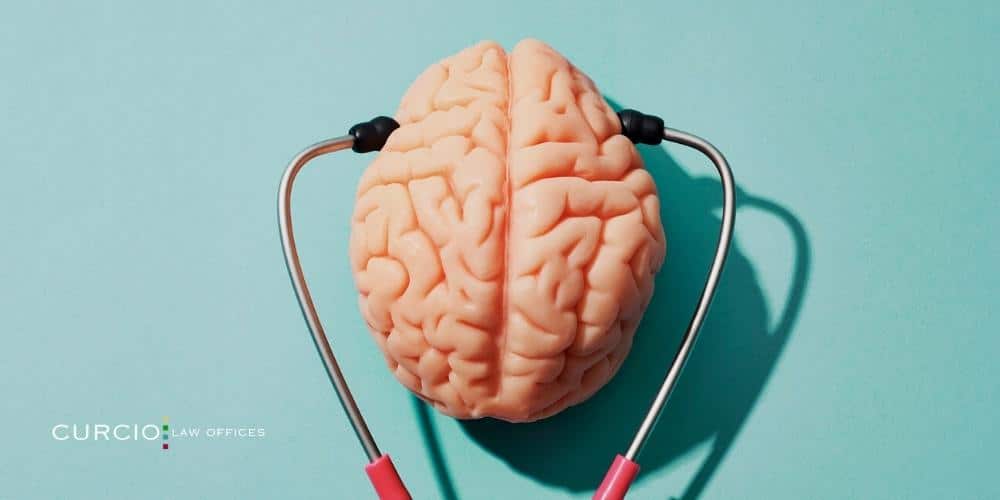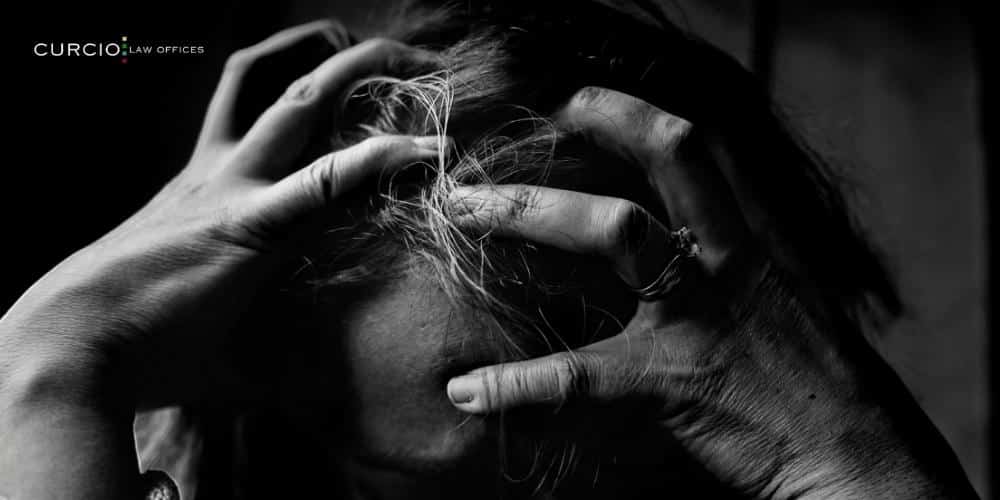CHICAGO EMOTIONAL DISTRESS ATTORNEYS
PRACTICE AREAS
Chicago Emotional Distress Lawyer
Emotional distress often plays a big role in the average personal injury claim. But what many people don’t realize is that you can file a lawsuit just for mental distress, especially if negligence is the direct cause. Emotional health is just as important as physical health. Oftentimes, mental and physical health directly influence each other. A traumatic accident can ruin a person’s life emotionally and physically, and victims should be able to recover financial compensation for that suffering. A Chicago emotional distress lawyer can help emotionally traumatized victims recover damages for medical bills, counseling bills, lost wages, and more. Call 312-321-1111 to schedule a free consultation with a Chicago personal injury lawyer today.

What is Emotional Distress?
Emotional distress is when someone suffers severe mental and emotional health issues often following a traumatic event. Many emotionally distressed people can also experience physical symptoms and pain. Long-term, intense mental anguish can manifest as disorders such as:
Post-traumatic stress disorder (PTSD)
Panic disorder
Generalized anxiety disorder
Social anxiety disorder
Agoraphobia
Separation anxiety
Obsessive-compulsive disorder (OCD)
Major depressive disorder
Our Chicago personal injury attorneys are often asked, “Can you sue for PTSD?” Yes, you can, in some cases.
What is Intentional Infliction of Emotional Distress Claim?
Intentional Infliction of Emotional Distress (IIED) is a type of tort that occurs when someone commits a horrendous act in order to intentionally cause psychological injuries. An example of an intentional act would be threatening someone with a major physical injury or wrongful death.
Certain elements must be present in a mental anguish claim in order to qualify as Intentional Infliction of Emotional Distress. In general, the defendant’s actions were intentional infliction and caused major emotional trauma or serious injury to the victim. Any reasonable person would suffer due to the intentional or grossly negligent infliction.
If you’re suffering emotionally after a traumatic incident and you meet this criteria, Chicago personal injury attorneys for infliction of emotional distress can help you. Obtaining justice and recovering compensation after the negligent infliction of emotional trauma can feel overwhelming, especially without legal counsel. Allow an experienced Chicago accident lawyer at Curcio & Casciato to take on your case and help you claim compensation.
If your loved one died as a result of this, contact a Chicago wrongful death attorney at Curcio & Casciato.
Emotional Distress Claims vs. IIED
These are different types of cases. The first is generally connected to physical injuries. Meanwhile, a physical injury may not be present in an IIED claim. That’s because, in an IIED claim, the defendant’s conduct may not have been physical. Intentional or grossly negligent infliction claims often entail threats or warning signs of harm, harassment, emotional manipulation, gaslighting, or even performing acts of violence on someone else in front of the victim.
You will need strong legal representation from a Chicago emotional distress lawyer for both types of claims.
Common Symptoms of Emotional Distress

Uncontrollable crying
Panic attacks
Intense fear and anxiety
Depression and hopelessness, little to no self-worth
Substance abuse (including prescription medications and alcohol)
Intrusive/suicidal thoughts, self-harm
Emotional numbness (dissociation/derealization episodes)
Neglecting basic self-care
Difficulty concentrating, struggling to go to work/school or perform daily tasks
Social withdrawal (avoiding certain people, places, situations, etc., no interest in enjoyable activities, rarely ever leaving the bed or the house)
Memory loss
Flashbacks
Jumpiness or strong reactions
Sleeping problems (nightmares, chronic fatigue)
Intense emotions, mood swings, rumination
Physical symptoms, such as tense or sore muscles, elevated heart rate, heart palpitations, hyperventilation, GI problems (nausea, vomiting, diarrhea, constipation, lack of appetite), frequent headaches, skin rashes and hives, sexual dysfunction
Emotional health issues like these are often just as serious as physical injuries because they can severely disrupt every aspect of someone’s life. Family members, friends, and partners of emotionally distressed people can also suffer just from seeing their loved one in so much pain.
Chicago emotional distress attorneys at Curcio & Casciato recognize the severity of psychological injuries. We want to help victims restore their lives to their pre-accident state with fair compensation and justice by pursuing economic damages and non-economic damages in civil court.
Major Accidents and Traumatic Incidents That Can Lead to Severe Emotional Distress
Common examples of traumas that can lead to both psychological and physical injuries include:
Auto Accidents
Auto accidents can have profound emotional impacts on victims, necessitating the guidance of a Chicago car accident lawyer, Chicago bus accident lawyer, or a Chicago semi-truck accident lawyer for cases involving large vehicles. Chicago pedestrian accident attorneys are crucial when individuals are struck in crosswalks or sidewalks, while Chicago motorcycle accident lawyers and Chicago bicycle accident lawyers represent those injured in two-wheeled vehicle incidents, including bicycle dooring accidents. The trauma experienced from these auto or pedestrian accidents can lead to long-lasting mental anguish, significantly affecting victims’ quality of life.
Medical Malpractice
Victims of medical malpractice endure not only physical harm but also significant emotional turmoil. A Chicago medical malpractice attorney can offer crucial support to those affected by negligence, including cases handled by a Chicago birth injury attorney where newborns suffer due to delivery room errors.
Similarly, a Chicago brain injury lawyer addresses the complex aftermath of brain injuries caused by medical oversight, while a Chicago spinal cord injury lawyer, Chicago paralysis lawyer, or Chicago amputation attorney aids those whose lives are altered by spinal damage.
The mental anguish in these scenarios stems from the profound impact on the victim’s health, autonomy, and future.
Child Abuse or Neglect
The emotional scars left by child abuse or negligence are deep and long-lasting, requiring the expertise of a Chicago child injury lawyer to navigate the sensitive legal landscape. Chicago school injury lawyers play a pivotal role when abuse or negligence occurs within educational settings, providing a safe avenue for justice and healing. Chicago dog bite lawyers are key to getting children the help they need for emotional and physical injuries when they are traumatized after an attack.
Cases of sexual abuse, particularly involving children, are among the most harrowing, with victims often experiencing physical injury along with severe anguish that can affect them well into adulthood. Legal intervention in these cases is not just about seeking justice but also about facilitating the path to emotional recovery for the young victims.
If someone else’s negligence caused one of the aforementioned incidents – and you have suffered a physical injury and/or mental anguish as a result, you deserve quality representation. A Chicago personal injury lawyer at Curcio & Casciato may be able to help you.
Can You Sue for Emotional Distress?
Yes, you can sue for emotional distress if someone else’s negligent actions or inactions directly caused the damage. In fact, the average personal injury lawsuit will often provide compensation for the emotional trauma associated with the personal injury.
The main challenge in an emotional distress claim is proving that the victim’s emotional distress is real, valid, and worth compensation. This is obviously a bit more difficult than proving that physical injuries are real and valid. Someone who is physically injured has obvious wounds, disfigurement, and/or disability. Emotional distress and mental illness are often “invisible” but still very real and valid. So, in order to prove emotional distress, you need an experienced Chicago personal injury attorney or a Chicago catastrophic injury attorney on your side to help through the discovery process all the way up until civil court.

How to Prove Emotional Distress
In order to recover emotional distress damages after a major accident or traumatic event, you need to prove that mental distress is occurring because the defendant could easily claim that you’re lying even if you’re not.
An experienced attorney at Curcio & Casciato can help you do this by gathering evidence that shows the duration and severity of the emotional pain. Additionally, we can help you gather evidence to prove fault and to highlight the severity of the accident. Lastly, expert witnesses from medical professionals and licensed counselors can provide insight on whether severe emotional distress has occurred.
Duration of Emotional Distress
Most people experience some level of emotional distress following a physical injury or major accident. However, some injured people’s emotional distress dies down significantly as they heal from their injuries. Emotional distress that only lasts a few weeks immediately following the event may not be enough to build a strong claim against the negligent party.
However, if you have suffered severe PTSD symptoms for months and years following the accident, you may have a really strong claim against the negligent party.
Severity of Emotional Distress Symptoms
Symptom severity is also important to consider in emotional distress claims. In order to have the strongest claim possible, your symptoms must be severe enough to greatly disrupt your life for weeks, months, and years after the accident. Maybe the mental anguish even started manifesting as physical pain and symptoms such as headaches, GI problems, musculoskeletal pain, etc.
For example, maybe you had to drop out of school or quit your job after your traumatic incident because of frequent flashbacks and panic attacks. Maybe you also needed to start taking daily antidepressants and anti-anxiety medications on top of seeing a therapist regularly. Maybe you even needed to be hospitalized in a psychiatric ward. All of this can be proved through medical records. Scenarios like this would help create strong emotional distress claims.
Severity of the Accident or Traumatic Incident
The strongest personal injury claims are filed due to severe accidents. Suing someone for emotional distress caused by a fender bender – instead of a catastrophic car accident, for example – probably won’t be a strong or successful case.
Who is At Fault?
Proving fault in an emotional distress claim can be difficult, especially if the victim already suffers from mental health issues. These pre-existing issues could be greatly exacerbated by something like a medical malpractice or car accident case. Therefore, it can be difficult to figure out who is to blame for specific mental health disorders or symptoms.
Generally, though, if your emotional distress symptoms began immediately following a traumatic car crash caused by a drunk driver, for example, you could place full blame on that drunk driver.
If this happened to you, contact our Chicago drunk driving lawyer for more information.
Expert Witnesses
Getting statements from professionals who have provided mental health or medical treatment is a crucial piece of emotional distress evidence. These professionals could certainly provide insight into symptom duration and severity. Additionally, they could provide proof of psychiatric drugs, hospitalizations, treatments, etc.
Emotional Distress Damages

You can recover compensation specifically for emotional distress in a general personal injury claim. Emotional distress typically falls under the category of non-economic damages because it’s nearly impossible to measure it monetarily.
If you want to just file an emotional distress lawsuit, compensation for solely emotional damages may look different than damages in a typical personal injury lawsuit. For example, you could recover financial compensation for:
Medical bills, including bills for psychiatric medications and psychiatric hospitalizations
Mental health counseling bills
Lost wages if the emotional distress caused you to take time off work
Loss of earning capacity if your emotional distress prevents you from accomplishing the same job duties as before
Loss of consortium if your emotional distress causes significant strain in your marriage/partnership
Loss of enjoyment of life
Chicago Personal Injury Lawyers for Emotional Distress
If someone else’s negligence has caused you significant, long-term emotional distress, you may have grounds to pursue legal action. Chicago personal injury attorneys at Curcio & Casciato have what it takes to successfully litigate emotional distress cases and recover maximum compensation for traumatized victims. We will walk you through the entire claims process and protect your legal rights the whole way. Call 312-321-1111 to schedule a free consultation with our team today.


